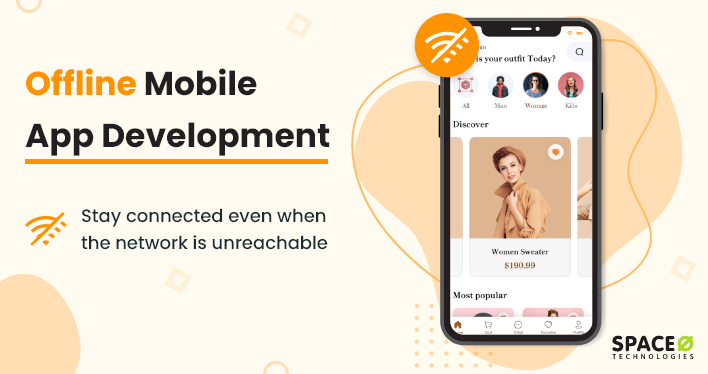Does your mobile app work offline?
Are you facing app crashes as soon as your network signal goes out?
If that is happening with you frequently, you need offline mobile app development.
Because, if your app won’t load properly, there are higher chances that users will leave early before the app loads completely.
You might be surprised to know that, there were over 8218 hours of internet shutdown across the globe. It has cost the global economy over $3 billion. In this situation, offline mobile app development can become the best solution.
By having an offline native app, you don’t need to bother about the poor data connection or the internet. But the question arises, how do offline apps beat online applications? Being a mobile software development company, we discussed this topic with our experienced app developers and noted down the benefits, technologies, and features of launching an offline-first app.
Table of Contents
- Offline Mobile Application Development Explained
- How Much Does it Cost to Develop Offline Mobile Apps?
- Why Should You Opt for Offline App Development?
- Which Industries Require Offline Mobile Application Development?
- What are the Top Offline-first Technologies?
- Top Examples of Offline Mobile Apps
- FAQs About Offline App Development
- Want to Develop an Offline App for Your Business?
Offline Mobile Application Development Explained
With a world so reliant on mobile devices, the majority of people feel restless when they are unable to access the internet. Thankfully, emerging technology has paved the way for the usage of offline native applications.
Due to poor internet connection, many mobile applications have been discarded by smartphone users all over the world. This has made businesses turn towards offline app development.
Now, let us explain the meaning of offline native/mobile application development.
Looking to Build an Offline Mobile App for Your Business?
Discuss your custom app requirements with our experienced consultant and develop your own offline mobile app.

What is Offline Mobile Application Development?
Offline-first apps can download data from the server and store it on the mobile device of users so that they can access that data even in offline mode.
Offline-First Approach to Mobile App Development
An offline-first approach allows you to store data and manage it locally on the mobile device to make the mobile app work in the offline mode as well. There are 3 approaches to storing, syncing, and updating the local data which are mentioned below.
Caching to Manage Local Data Faster
The easiest and fastest way to manage the local data is to cache it so that you can access it even when the database connection is unavailable. For simple apps caching will suit perfectly.
Manual Replication to Avoid Data Disputes
This offline first approach allows you to modify the viewed data even in offline mode. When the app gets connected to the database, you can upload those changes manually. Though this approach is more advanced than caching, manual replication is prone to data conflicts.
Real-Time Data Synchronization to Enhance App Performance
This offline first approach is similar to manual replication and allows you to upload data automatically. The major benefit of using real-time data synchronization is that it allows the system to resolve conflicts automatically, improving the overall performance of your mobile application.
So, understood the meaning of offline native application development? Let’s learn about the industries that need to head towards offline first app development.
How Much Does it Cost to Develop Offline Mobile Apps?
But the cost of app development also depends upon the features and functionality of the mobile application.
Let’s have a look at some of the factors that affect the actual mobile application.
Factors on Which the Cost of Mobile Application Development Depends
- Application Development Partner i.e. Freelancer or Development Company
- Location of the App Development Partner
- Features of the App
- The complexity of the Appv
- Mobile App Development Platforms i.e. Android or iOS
- App Design Complexity
- Industry Type
To help you understand better, we have created the following table containing the type of mobile application and estimated cost.
| Different Types of Offline Mobile Apps | Approx Cost |
|---|---|
| Simple | $20,000 to $25,000 |
| Medium | $30,000 to $50,000 |
| Complex | $60,000 to $1,20,000 |
Why Should You Opt for Offline App Development?
There are numerous reasons to choose apps with offline mode which are highlighted below.
| Reasons to Opt for Offline Mobile App Development | Description |
|---|---|
| Less Battery Usage | With too many applications running on the phone the battery drains fast. So, the majority of users prefer to use offline apps so there is no need to keep the internet running. |
| Faster Loading Time | Offline-first apps not only save you money but also offer plenty of users. These apps offer speedy loading even if the internet connection is not working properly. |
| Better User Experience | Due to caching ability, offline-first apps allow users to browse pages that were previously viewed without the need for an internet connection. |
| Gain A Competitive Edge | Do you know why WhatsApp and Facebook are popular? The reason is their functionality, performance, and user experience. But apart from these features, users are demanding these apps to work smoothly even in offline mode. The offline state keeps the work going and helps you win over your competitors. |
| Improved Customer Loyalty | It’s no secret that users prefer to use applications that run without any difficulties. If they see that your mobile app is reliable even with no internet, they will simply love it. |
| No Roaming Charges Involved | Some apps need more data to access the large data network. If you are traveling abroad, it will impose more roaming charges. And using offline-first apps can help you access particular features at no cost. This not only saves money and data. |
| Simple Data Storage | Internet is essential to store data on the server for every mobile app. But, you don’t need to bother about internet connection in an offline first native app and it will store data on the server automatically once you get a stable web connection. |
| No Monthly Data Usage on Maps | Mobile apps that are working even with no internet is best for saving your data. It doesn’t use data for sending or receiving photos or web browsing. |
Know which industries require offline mobile app development by referring to the following section.
Which Industries Require Offline Mobile Application Development?
Let’s have a look at the top 10 industries that must use offline native applications.
| Type of Industries | Description |
|---|---|
| Healthcare Industry | Regardless of the types of healthcare apps, the usage of offline native applications will allow doctors to receive information about patients without an internet connection. These offline web apps are beneficial for all niches such as weight loss, nutrition, fitness, pregnancies, and more. |
| Finance Industry | Banks all over the world are expecting to invest their resources into offline native app development to keep up with the financial activities happening on the apps. Even, offline apps help in mobile banking app development as well. |
| Entertainment Industry | It’s no secret that Facebook has become one of the most popular mobile applications across the world. Other big mobile applications include YouTube, Netflix, and more. Imagine! What will happen if the entertainment industry begins to use offline native apps? It will gain more people to communicate. |
| IT Industry | The IT industry has been expanding so fast through the use of mobile applications. Turning to offline app development can help the IT industry function on the go. |
| Tourism and Travel Industry | AirBnB and other travel apps have helped the industry become more powerful. You can book your flights, hotel rooms, or tours using offline native apps even without having an internet connection. |
| Fashion and eCommerce industry | With the use of offline native applications, enhance your shopping experience. One such example is Amazon which runs offline to offer a seamless experience to users. |
| Real Estate Industry | The majority of realtors, brokers, and property owners are already using smartphones to connect with potential customers to buy properties. Leveraging offline native apps will help real estate professionals as well as customers, saving their time and hassle. |
| Education Industry | Due to COVID-19, e-learning has started growing at a high pace. Having offline native applications in the education industry can help in facilitating learning and keeping up with progress and scores. You can even create a language learning app like Duolingo for your education business as well. |
| Hospitality Industry | Mobile apps have grown due to the pandemic as users prefer to order meals online. If this industry will begin to use offline native apps, ordering food will become more convenient. |
| Logistics Industry | With the help of mobile applications, package tracking has become easier. The logistics industry will become accessible with the use of offline native applications. It will improve consumer-to-business and business-to-business transactions. |
You have learned about the top industries that need offline mobile apps. But what technologies to apply to develop successful offline apps? Get your answer in the next section.
What are the Top Offline-first Technologies?
| List of Technologies | Benefits |
|---|---|
| Progressive Web Apps |
|
| Polymer App Toolbox |
|
| Hoodie |
|
| Ionic |
|
| Couchbase Mobile |
|
| Realm Mobile Platform |
|
| Mapbox Mobile |
|
Want to Know the Cost of Offline Mobile App Development?
Let’s talk. We have developed more than 4400+ mobile apps and develop featureful mobile apps according to your requirement.
Top Examples of Offline Mobile Apps
| Icon | Offline Mobile Apps Examples | Features of Offline Mobile Apps | Rating (Play Store) |
|---|---|---|---|
 | Google Drive |
| 4.3 94L Reviews |
 | Google Maps |
| 3.9 1.63Cr reviews |
 | Spotify |
| 4.4 2.69Cr reviews |
 | Netflix |
| 4.4 1.35Cr reviews |
 | Google Translate |
| 4.5 85.2L reviews |
 | Amazon Kindle |
| 4.7 26.6L reviews |
 |
| 4.8 3.05L reviews |
Still have some questions in your mind about offline native app development? Check out the frequently asked questions to get a clear idea about this approach.
FAQs About Offline App Development
What things to consider while developing offline mobile apps?
In mobile app development and user experience, AI impacts in the following ways.
There are numerous reasons to consider developing offline native applications.
- The major reason to consider offline first application development is that this app works offline, saving your battery.
- Offline native applications run smoothly even with no internet connection.
- An offline app is more likely to be used by travelers and tourists.
- Your offline app doesn’t need online functionality, making it faster and more reliable.
- These applications help you gain more customer loyalty.
- Offline native applications provide you with a way to manage caching process efficiently.
Why you should implement offline mode in your mobile app?
There are several reasons why you should implement offline mode in your application. Here are the reasons to implement offline mode in your mobile app.
- Enhanced customer loyalty
- Offers a better user experience
- Saves time in browsing the app
- Saves mobile battery
- Gain a competitive edge
- No roaming charges
Want to Develop an Offline App for Your Business?
In this guide, we have comprehensively discussed the following points.
- The meaning of offline mobile app development
- Cost of offline mobile app development
- Industries that require offline mobile app development
- Top offline first technologies
- Top examples of offline app development
You will learn each aspect of how to develop offline mobile apps after understanding the above-mentioned topics. If you are planning to develop a mobile app for your business, make a smart choice by choosing an offline mobile app. As a leading mobile app development company, we have experience in successfully developing 4400+ mobile apps.
Contact our app development consultants, share your requirement and turn your idea into a live app.




